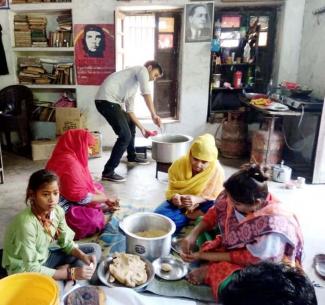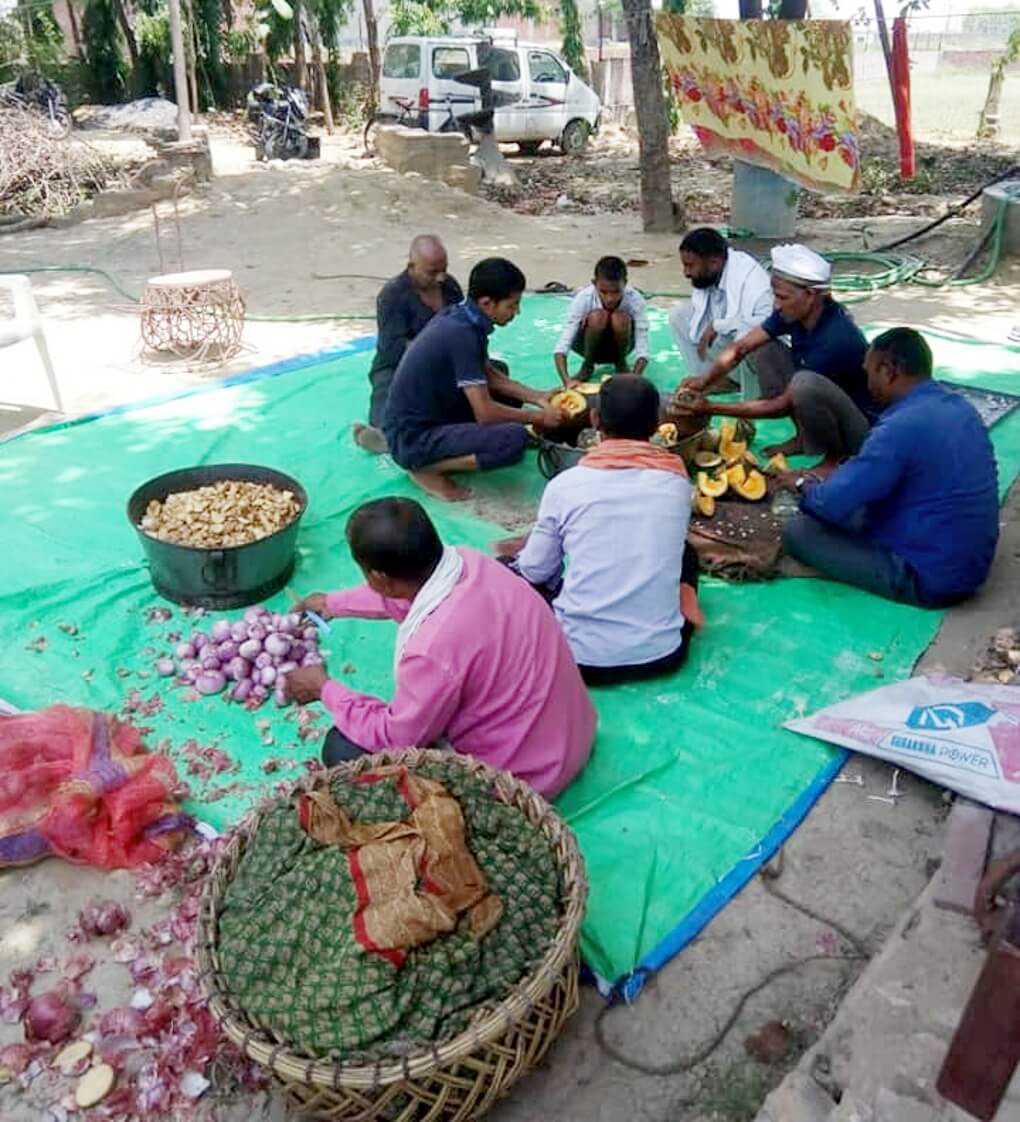
THE sudden lockdown imposed on 23 March struck a severe blow on the livelihood of many daily-wagers, poor, sick and old people. With little or no government aid in sight, these sections of the population were staring at imminent starvation. At this point, CPI ML Varanasi intervened by forming a collective of about a dozen organizations which included AISA, Bhagat Singh Chhatra Morcha (BCM), AISF, Nagrik Adhikar Manch, United Against Hate, AICCTU, AIPWA, All India Secular Forum etc. Many young people, who had been part of the anti-CAA movement led by our party till the pandemic attack struck, enthusiastically joined the campaign to provide relief to the needy. A dedicated Whatsapp group was formed for communicating and dissemination of information about the relief work and an appeal was made to the people of Varanasi to contribute fund to a bank account. The response of the citizenry was overwhelming. Within a couple of days, sufficient fund had poured in and the relief team started preparing food packets comprising of wheat flour, rice, pulses, spices, oil, potato and a soap. At the time when there was a great fear about the spread of the virus, the team, following the norms of physical distancing , set a fine example of putting service before self. The party office was buzzing with activities related to procurement and packaging of the relief material. Small teams would then distribute the packets amongst the most vulnerable sections of the population. The localities where the relief material was distributed were Shivpur, Bhojubir, Pakki Bazar, Nadesar, Bajardiha etc.
This daily distribution continued for about two weeks . During this activity , when the volunteers were going among the needy, they observed that many sanitary staff who were cleaning the city did not have proper protective kit and were at a great risk of getting infected. Thereafter, masks, hand gloves, sanitizers were distributed among the sanitary staff.

It was realized that while practising physical distancing, social bonding between people was the need of the hour. With this idea, the relief team members came up with a plan of setting up mohalla or neighbourhood Kitchens. Before starting a kitchen, a meeting of local volunteers of that mohalla decided on the logistics of operation: where would the food be cooked, who would arrange for the utensils, who would make a list of the needy families - all these issues were addresses collectively. An important component of this kitchen was resource generation. The local volunteers were involved in fund collection from neighbouring well-to-do residential colonies. Any shortfall in resources was taken care of from the fund generated by the central relief team which could collect about 5 lakh rupees from the citizens of Varanasi. Initially, four mohalla kitchens started and operated successfully for a few days. However, it was the mohalla kitchen of Manyawar Kanshi Ram Awas Yojana that could be sustained longest, and is continuing for the last 43 days as we write this report.
From the volunteer teams of the mohalla kitchen, 35 members have enrolled as CPIML members. Preliminary work has been initiated for formation of Auto-rickshaw Drivers’ Union, Domestic Workers’ Union, Construction Workers’ Union etc. In this time of crises, the work done by the volunteers has generated strong bonds of camaraderie between the residents of the Mohalla and they have begun to discuss among themselves the socio- political reasons for their deplorable living conditions. They are now getting mobilized to demand employment from the local administration by submitting a memorandum on this issue.
Liberation Archive
- 2001-2010
-
2011-2020
- 2011
- 2012
- 2013
- 2014
- 2015
- 2016
- 2017
- 2018
- 2019
-
2020
- Liberation, JANUARY 2020
- Liberation, FEBRUARY 2020
- Liberation, MARCH 2020
- Liberation, APRIL 2020
-
Liberation, MAY-JUNE 2020
- Stand With the Cyclone Ravaged Areas and People : Donate Generously to Relief Efforts
- The Lockdown Has Unlocked India's Suppressed Social Reality of Migrant Workers
- Modi's Covid19 Stimulus Package: Monumentally Deceptive and Disastrous
- Enslaving India's Workers and Renting Out India To Global Capital Is Not the Way to Self Reliance
- Dealing with the Lockdown: Precious Lessons from the Unique Experience of an Unprecedented Phase
- Remembering Ambedkar amidst the Covid19 Pandemic and Lockdown
- May Day 2020 : International Day of Workers in Times of Global Pandemic
- The 202nd Birth Anniversary of Karl Marx
- Experiences of Relief Work in Bihar: Government Abdicates, People take Initiative
- Lockdown Emboldens Feudal, Communal and Criminal Forces
- The Girl on a Bicycle
- Will the Government Not Give Us Jobs?
- Migrant Workers of Jharkhand Stranded in Maharashtra During Lockdown
- Lockdown Relief Reports from Uttar Pradesh
- The Varanasi Mohalla Kitchen Experience
- CPIML Activities in Kerala during the Lockdown
- Initiatives in Tamil Nadu During Lockdown
- Covid 19 Lockdown Relief Work in Chandigarh
- Thousands of Distressed Workers in Jaipur Come Out on the Streets
- Relief Work During Lockdown in Delhi
- Invisible but Irreplaceable? Migrant Labour BC 2019 and AC 2020
- Karnataka : Notes on Migrant Workers Assistance Campaign
- The Pandemic and Beyond : Free Quality Healthcare is a Fundamental Right
- Epidemic Act 1897 : A Draconian Colonial Hangover
- Kerala Model Delivers in Covid -19 Control
- A Note on Herd Immunity
- Modi Regime's War on Working Class
- Attacks on Students and Public Education
- The Pandemic's India Journey: Short Takes
- Open Letter to British Labour Party Leader: Don't Align the Labour Party with Allies of Modi's Far-Right Regime
- Facilitating the Corporate Plunder of Kashmir Under Cover of Covid19
- Hunger Strike by CPIML Leader BN Singh Incarcerated in Medini Nagar, Jharkhand
- Hari Vasudevan
- Tribute : Comrade Narender Kumar & Comrade Suhail Akhtar
- Liberation, JULY 2020
- Liberation, AUGUST 2020
- Liberation, SEPTEMBER 2020
- Liberation, OCTOBER 2020
- Liberation, NOVEMBER 2020
- Liberation, DECEMBER 2020
- 2021-2030
Charu Bhawan, U-90, Shakarpur, Delhi 110092
Phone: +91-11-42785864 | Fax:+91-11-42785864 | +91 9717274961
E-mail: info@cpiml.org







